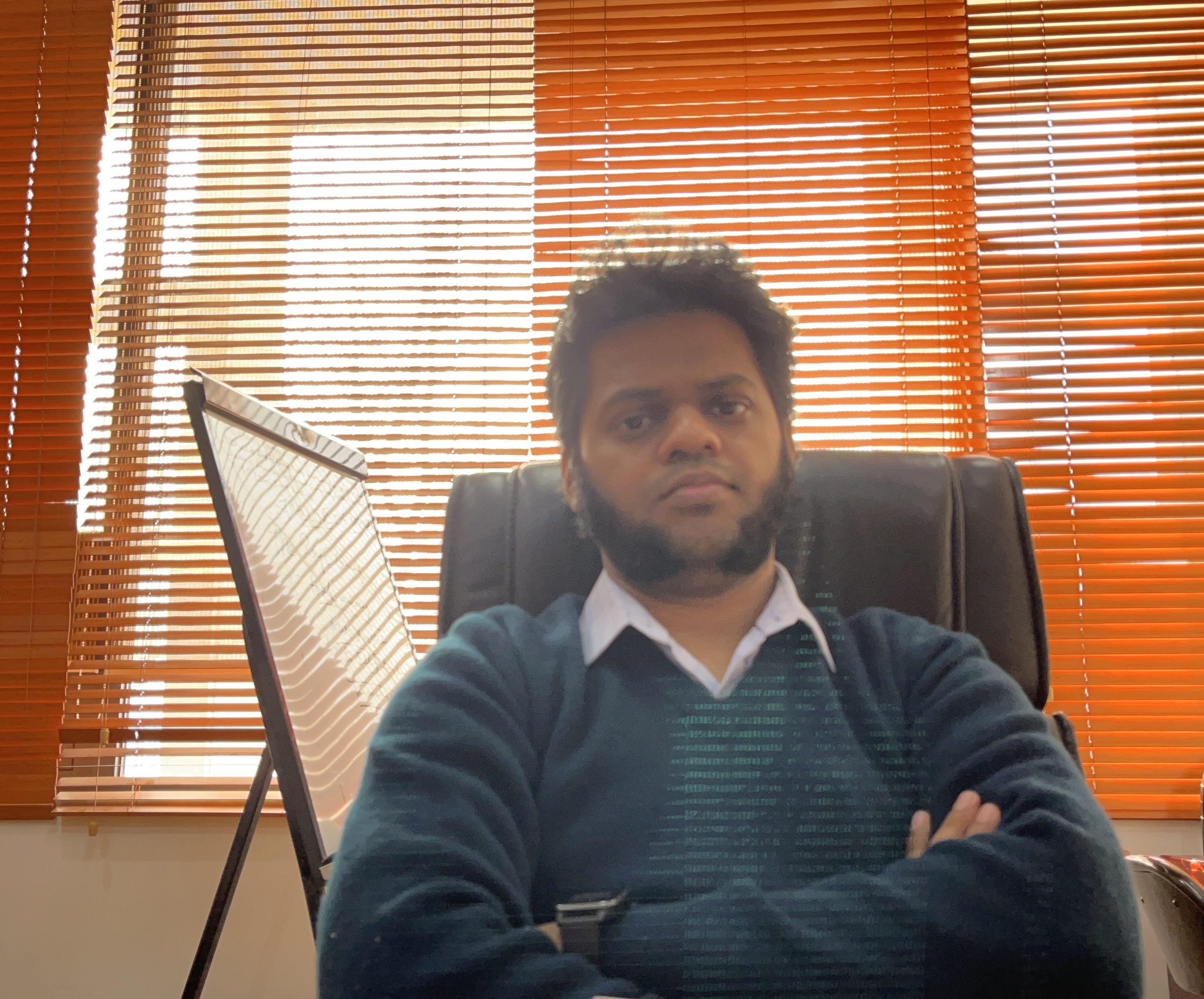Vivekanand Selvaraj, our featured writer for February, shares a series of ten poems in the “CogVerse“—a lyrical realm more familiar than strange, and yet strangely mesmerizing. Keep reading for a brief interview and critical accompaniment.
The Work
CogVerse
(A Ballad of the cogs, being a mise-en-scene Act)
The Happy Prologue When I arrived At its gates trembling, There were faces hanging From the branches smiling. There were faces They-were-faces. Then they were still Faces They certainly looked Like faces. Certainly . . . yes . . .
This Machine Does Not Kill Fascists.
This Machine does not kill fascists.
But it likes make-up sets, especially rouge
or lipstick from someone else’s
clutch.
Not the pocket mirrors,
for it fears its own image
or name
Like the devil itself.
It shrinks into a mask,
hides behind the smile
that makes it a face.
And hangs it on the branch
The Word Is Mercy
(alliterates with Machine)
The word is ‘mercy’.
The Machine does not cannot
Love.
Does not shake hands
kiss lips
wipe tears
hug bodies.
The word is ‘generosity’/In its eyes
Is an ice-cream cart/Vendor-less.
In its ears, a rock concert/Empty arena.
Its hands are at a florist’s/Paper perfumes.
Its feet prowl a weekend playground/The Ghost town game.
At the day’s end,
the cogs return (drum roll) to an unlit house, to children
sleeping in dark bedrooms.
The Cogs’ Coffee Table Sometimes, the cogs gather for coffee. There’s a lot going on outside. A rare sunny morning seems to open their hearts up. The cogs part their lips and pause preferring eventually to sip the black liquid they think fuels the machine. But it’s actually their silences.
Therefore They Are Cogs. There are cogs and there are Cogs. One thinks the Machine and itself understand each other quite well. Another thinks the Machine needs to Empathise. Develop human heart and ears. The Machine itself has no such Pretences, holding the cogs down in their preferred positions.
The Sources of Power The Machine's power source is not physics-defined. The illusions of the cogs Do not reside in the same coordinates. Their worlds don't collide Because their expiry dates are inversely proportional to the entropy of their diminishing inter-orbital distance.
The Cogs’ Dental Hygiene
When the cog brushes its teeth,
the blood stains are news.
It does not recollect
the killings or the cries
Or the sound of bones breaking
Breaking the sacred space of its
numbness.
One more careful look—since
they cannot be bleached snow,
it marks them unread
once again.
His Master’s (Passport) Address
Sure enough, the cogs soon despaired
to meet their Maker.
If they can’t fix a meeting up, at least
they could catch a glimpse
of the mugshot.
The hired–hand sleuth’s
probe, epistemological when not
existential, hit road blocks in a wilderness
of open lanes.
“No one has seen or touched
Him/Her/It. In the air, ocean and vacuum,
sensors return blind. What material maketh
that power—fibres of flesh or molten metal,
What twists the sinews
of His/Her/Its heart, no one knows”,
rhymed the sleuth.
Liberation is when slaves arrive at the Master’s
house. And till then the Machine resides
In the cogs’ heads.
The Cogs’ Bodhi Tree Desperate to fish meaning out of their numbness, the cogs pursue their moments into needle’s eyes. Where wisdom is scarce, false prophets abound. The cogs need their pills to fully immerse themselves in the ‘being’ of their cogness. Some cogs want to save nature. Some write poetry. Others like to travel. Some others woo strangers searching for meaning in the online ocean. Whatever works for each, each does, thinking that each is unique. That each is irreplaceable. That each is pushing the envelope of dumb existence into an alive moment. The word, the cogs imagine, is ‘Agency’. All of which have been paid for and insured by the Machine.
Rogue-o-cog
It’s only when a cog goes rogue
that pockets of self-actualization coalesce
into a super-consciousness, that the Machine
comes alive.
For when a cog goes rogue, its kin
gather like meerkats upon a toxic
island. Pricked ears—wondering
if they have missed a trick. If they crossed
the Rubicon, they do not remember that.
But when the big cat desires flesh,
“toss the odd ones in”. In the myth, the forest
guards a single tooth.
Brief Interview
Deva Eveland: You describe them as comprising a “mise-en-scene act.” Could you talk more about what you mean by that?
Vivekanand Selvaraj: If I’m not wrong, mise-en-scene is originally a theatre or a movie thing, where say you have a room, and in that room you have different objects that tell the viewer a lot of things outside of the content or plot. So, you have the full layout of the room and you can make your own meanings out of it. We have always looked at the machine from the outside. Instead, what if I went inside it? Get a snapshot of the machine at any point, and then start with this. Then I thought it was like a planet of cogs. I really didn’t want to make it like an anti-machine poem. I also wanted to see how the cogs derive something out of the machine. The cogs also do take pleasure in their cogness.
DE: A symbiotic relationship.
VS: A symbiotic relationship. Some of which is derived from a certain delusion which makes you feel good about being a cog. Also, that the machine could not have come into being in the first place without the cogs somehow conspiring and falling into their slots.
DE: If it’s not rude to ask, do you think of yourself as a cog?
VS: I think all of us are. I think all organizations, any type of organization creates a certain structure. Even those organizations that propose to be very open still have to have a certain structure. Even art organizations, Spittoon for example. Any organization that proposes to achieve a certain objective. The machine might be loose, tense. I still think it has a certain structure.
DE: Speaking of structure, how do you know when a poem is finished?
VS: I kind of think that when you’re inside the flow, you just know. When I reach a certain line, I realize I’ve said everything I need to say. If I do more, I’m just trying to be smart. So, you know when that point comes, and you stop it right here.
Critical Accompaniment
It is refreshing, at a moment when poetry is hard at work churning out pleasing chronicles of circumstantial detail, to read a poem like Vivekanand Selvaraj’s “CogVerse,” which really claims to know something. Though we are told this work is either a “Ballad” or “mise-en-scene Act,” it more closely resembles a good old-fashioned gnostic tale, with a demiurge updated for “our modern times.”
The central metaphor here is so old as to be idiomatic. The cogs are us small-time humans, grinding away in the big machine of society. We don’t know where the machine is headed or what it wants. We hardly even know it exists! Within its belly we scrape out what scraps of meaning we can, unaware all the while that our actions only strengthen the very power that oppresses us.
In pleasant style, Selvaraj catalogues the foibles and follies of this “modern condition.” We cogs gather for coffee and, unable to speak our hearts, settle for silence. We search for quick-fix “pills” in hip environmentalism, poetry, online-dating—certain that this will more “fully immerse” ourselves in “’being’”—only to find that all our ventures “have been paid for / and insured by the Machine.” We allow “the killings or the cries” of the world to remain “unread,” careful to maintain our ever so “sacred … numbness.”
Selvaraj’s range of references—Woody Guthrie, Buddhism, William Blake, Life of Pi, a mélange of physics jargon—provide a kind of key to the sensibility behind this catalogue. It’s a very 60s attitude, with the “machine” serving as a more depressed and mechanical stand-in for “the man.” It’s obvious that this machine ain’t no good, but Selvaraj is bent on showing us how that isn’t enough, and how easily rebellion and false enlightenment only “hold” us cogs down in “preferred positions.”
So which way’s out? Selvaraj is a little slippery on this point. “Rogue-o-cog,” the final poem in the set, suggests that “It’s only when a cog goes rogue / that pockets of self-actualization coalesce / into a super-consciousness.” That all sounds perfectly fine, except that it comes immediately after a scathing critique of all sorts of “false prophets,” each convinced they are “pushing / the envelope of dumb existence / into an alive moment.” If that rebellion of the heart is empty, what makes our rogue cog different?
This is where our gnostic quest ends. I’m not certain that, within the world of “CogVerse,” there is anything else. The central metaphor almost assures us on this point. A cog either functions or breaks. It has no capacity to transform itself or others. What’s offered to us cogs instead is a gnosis—a knowledge that might just allow us to transcend ourselves and the Machine. Perhaps it has something to do with that Blakean Maker who “resides” in all our heads, and who cannot be found in the world—perhaps. But more likely the cogs will just spin on and on.
—Jack Calder


Vivekanand Selvaraj writes in both English and Tamil and translates from Chinese and English to Tamil and also from Tamil to English. His work has appeared in The Bombay Literary Magazine, Nether Quarterly (Revival issue), Bengaluru Review, Poetry at Sangam, Sonic Boom, Vayavya and The Freedom Review. His debut collection of Tamil poems, Sudhandhiram Oru Dabba was released in January 2021 (Manalveedu Publishers). He is also an amateur theatre enthusiast, having written and staged quite a few of them. He is a diplomat currently stationed at Beijing.
Cover art by David Huntington
Interview conducted and edited by Deva Eveland
Critical Accompaniment by Jack Calder
